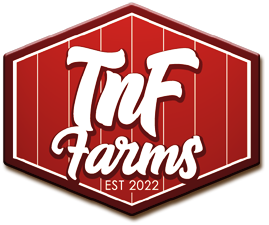Benefits of Barn Cats
When we moved into our current homestead and started TnF Farms, both of us were surprised by how common rodents were outside. We had some ground activity that seemed consistent with moles or voles near our house. The locations where we kept livestock automatically attracted rodents like field mice and rats. For the most part, I’m a live-and-let-live kind of person when it comes to wildlife. I usually try for the most natural approach or give nature a little time to find the balance. We do have our fair share of earth snakes, oak snakes, and black racers on our property. They certainly did their part to control the rodents.
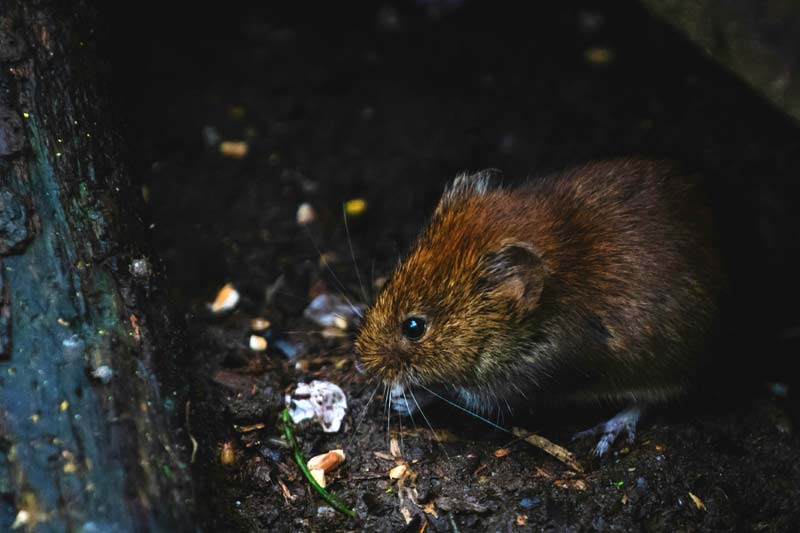
Photo via Pexels
However, we found that we were starting to get overrun with rodents in our livestock areas. They came out at night to eat spilled or leftover livestock food. These rodents also would go after young chicks if there were nothing else available. I didn’t think that was possible but our outdoor cameras revealed a lot for the rodent population and what they were capable of. Rodents can also spread sickness or disease through their dander or bites. I also found these rodents made homes in outdoor vehicles and chewed their electrical wires. My wife was getting a little impatient with me waiting for nature to catch up and I had to admit, we were starting to have a problem.
We tried the gamut of trapping devices.
The battery-powered electrocution traps and had marginal success. We also bought bucket traps where you baited mice and rats to fall through a trap door into the water to drown. Those traps never really caught anything. I also had a hard time with drowning an animal. Even if it is considered a nuisance. The old-fashioned snap traps seemed to work the best. We had to be careful using the electric traps or snap traps around our chickens as we didn’t want to get them. But I had a clearer conscience with traps that killed the rodents instantly. Other than having to remember to check traps and rebait them, we reduced our rodent population steadily. We still utilize some of these traps but we have also found that once we deployed the ultimate rodent weapon, rodents are now barely a thought.
Cats. More specifically, barn cats or outdoor working cats.
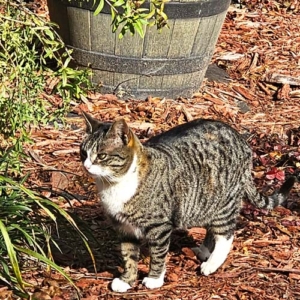 Faith suggested cats. I have been allergic to cats all of my adult life so I was very resistant to the idea. My other concern was they would start outside and then become inside cats. I rolled my eyes at the thought of more mouths to feed and I argued that cats may help with rodents but they will also eat other animals we want around and possibly our chicks. Finally, my wife wore me down and we ended up adopting some cats.
Faith suggested cats. I have been allergic to cats all of my adult life so I was very resistant to the idea. My other concern was they would start outside and then become inside cats. I rolled my eyes at the thought of more mouths to feed and I argued that cats may help with rodents but they will also eat other animals we want around and possibly our chicks. Finally, my wife wore me down and we ended up adopting some cats.
There is a distinction between inside pets and outside working cats. I grew up with my mom having some cats that were pets. Inside cats as pets are typically plump and lazy. Usually, veterinary work, like spaying or neutering also removes the motivation for pets. Then pile on low-quality pet food that is more like a processed cereal and lack of exercise also contributes to house cats being lethargic and overweight.
So let’s talk about the benefits of barn cats or working outside cats
Natural Pest Control
Common cats are renowned for their exceptional hunting skills. These agile hunters keep the population of mice and rats in check. Their mere presence acts as a deterrent. This makes for a harmonious and pest-free environment for both livestock and stored grains.
Cost-Effective Solution
While other pest control methods may involve ongoing expenses, cats offer a cost-effective and sustainable solution. They require minimal upkeep compared to chemicals or exterminators. Making them an environmentally friendly and budget-friendly choice for farmers and barn owners.
Companionship
Beyond their pest control duties, cats also provide a little companionship. Our cats know we’re good to them and will sometimes want to rub on our legs or come over for a quick petting.
Low Maintenance
Common cats are known for their self-sufficiency. With their grooming habits and instinctual hunting skills, they require little intervention from us. Other than making sure they are current on their vaccines and observing that they are in good health. This low-maintenance characteristic makes them an ideal addition to the farm environment, where the demands of constant tasks are significant.
Disease Prevention
By keeping the rodent population in check, cats indirectly contribute to disease prevention. Rodents are carriers of various diseases that can affect both humans and livestock. With our cats on patrol, the risk of disease transmission is significantly reduced.
Now some of the cons of having barn cats or working outside cats
Lots of beneficial small animals disappear along with the rodents.
We used to have lots of anoles, skinks, sticky frogs, toads, and snakes moving around outside of our house. They do their part to eat insects and each other. Once we moved the cats in, these small animals were not as common.
This also included small birds, squirrels, and rabbits. Outdoor cats don’t discriminate, if they can take it down, they will. Once our male cat figured out how to hunt squirrels, he would chase them up and around our trees. We also watched him eat them once he got them.
Cats can be a little sadistic
We went out to investigate some racket to find our cats captured a baby rabbit. They would let it start to escape, just to catch it again, injure it some more, and then let it escape only to repeat the process. We immediately took the baby rabbit away and put it out of its misery. Unfortunately, we do not get an opportunity to save all prey from this happening. Our cats regularly leave us dead and half-eaten critters by our back door.
Adoption from an animal shelter
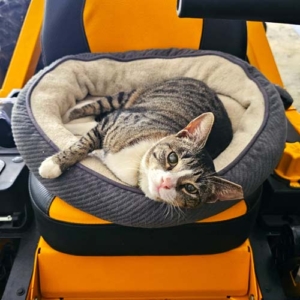
Sneaker now loafs.
We adopted two older kittens from an animal rescue. I don’t remember the exact cost, but I believe the pair was less than $100. One male and one female. These cats were used to humans but not necessarily friendly. I will admit to being an animal lover but remembering my allergies, I did not try to make them loving and snuggly. My wife on the other hand needed the coaching not to get super attached.
They quickly became very “under foot” so we named them after shoes. The female was always sneaking about and the male just loafed. So they got the names Sneaker and Loafer. Once the names were ingrained in them and us, the cats swapped behaviors! Sneaker the female is always loafing. While Loafer the male constantly on the hunt.
They spent the first few weeks inside our screened-in patio. We made sure they understood we were giving them food, water, attention, etc. Then we propped the door open on our patio so they could come and go. Eventually, we moved their shelter to the outside of our patio.
The shelter spayed our female spayed before adoption. I understand the importance of fixing at least one of the pair as we would get overrun with cats fast. The downside is that Sneaker has become quite plump and does not hunt nearly as much as our male.
At TnF Farms, we have working cats
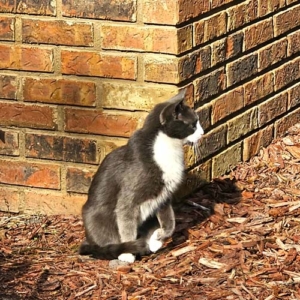 The cats have stuck around. Now and then a couple of days will go by without us seeing one of them. Sometimes it’s from us running loud equipment or Dobby is annoying them or it is just because they want to be gone for a while. But they always come back. They know we have food, water, and some goat milk sitting out for them.
The cats have stuck around. Now and then a couple of days will go by without us seeing one of them. Sometimes it’s from us running loud equipment or Dobby is annoying them or it is just because they want to be gone for a while. But they always come back. They know we have food, water, and some goat milk sitting out for them.
Whenever a customer is over and the cats are around, we always caution folks, that these are working cats. You can pet them if they let you but don’t pick them up. We never got them comfortable with that much human touch. Our male (Loafer) is tolerant of being picked up for a moment but he eventually loses patience and gets very restless. Our female (Sneaker) panics at being picked up. She has claws out and is biting to be let go and put down. Once her feet are on the ground, she’s ready to be petted.
We’ve decided the benefits of having working, outside cats outweigh the cons. From natural pest control to companionship and stress reduction. Sneaker and Loafer play an integral role in the holistic well-being of TnF Farms. As silent contributors to the agricultural landscape, cats deserve recognition for the value they bring to a homestead.
